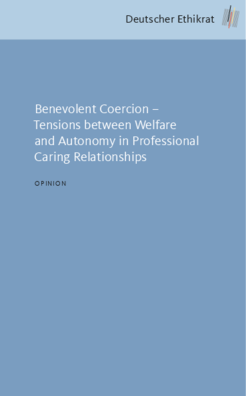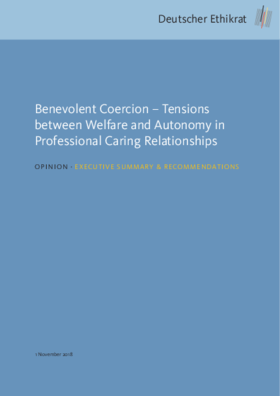Published: 1 November 2018
Coercive measures justified on the grounds of beneficence and care are widespread in health and social services. These include measures involving deprivation of liberty, such as the involuntary commitment of people in hospitals and other inpatient facilities or the attachment of bedrails or restraint belts, as well as medical treatments or care measures against the will of a patient or so-called intensive educational measures in child and youth services. If a person threatens to seriously harm him- or herself, such coercive measures can serve the person’s welfare. Nevertheless, every instance of such “benevolent coercion” represents a serious infringement of the fundamental rights of the person concerned and is therefore in particular need of legal and ethical justification.
This Opinion of the German Ethics Council has three objectives. First, we wish to raise public awareness of the problems and complexities around benevolent coercion and of the tensions between welfare and self-determination in the context of professional caring relationships. Second, we want to point out to politicians, legislators, and anyone involved in the practice of these professions the shortcomings in the regulations governing this field and in their implementation, and we formulate recommendations to contribute to the solution of these problems. Third, we aim to support the caring and healthcare professions in the ongoing reorientation of their self-conception and their practices as professional caregivers. It contains general recommendations for the responsible handling of coercion in professional caring relationships as well as specific advice for psychiatry, child and youth support services, and the fields of elderly and disability care.





